The unmistakable, fragrant aroma of fresh ginger is a key ingredient in many curries, providing a delightful warmth and depth to the dish.
This spicy, zesty root has a unique flavor that is difficult to replicate, yet sometimes you may find yourself without this vital ingredient, or perhaps you need an alternative due to dietary restrictions or personal preferences.
So, what are the best substitutes for fresh ginger in curry? The best substitutes for fresh ginger in curry include ground ginger, crystallized ginger, galangal, turmeric, cardamom, allspice, and a combination of cinnamon and ground cloves.
These alternatives may not provide an exact replica of fresh ginger’s taste, but they will certainly add a similar warmth and spiciness to your curry.
Fear not, your curry can still be delicious and full of flavor even without fresh ginger.
Let’s explore these substitutes and learn how to use them effectively to create a satisfying and aromatic meal.
Why Use Fresh Ginger in Curry?

Fresh ginger is commonly used in curry due to its unique flavor and health benefits.
Ginger adds a spicy, warm, and slightly sweet taste to curry dishes.
It can also help balance the flavors of other ingredients in the dish.
Ginger contains gingerol, a compound that has anti-inflammatory and antioxidant properties.
This makes ginger a great ingredient to add to curry dishes, which are often made with a variety of vegetables and spices that are also rich in antioxidants.
Additionally, ginger has been shown to aid in digestion and reduce nausea, making it a great ingredient to use in heavier, spicier curries.
Overall, using fresh ginger in curry not only adds flavor but also provides a range of health benefits.
The 7 Best Substitutes for Fresh Ginger in Curry
Fresh ginger adds a unique flavor to curries, but it can be hard to find in some places.
If you’re looking for an alternative, here are seven substitutes that will still offer the same level of flavor and spice:
1. Ground Ginger
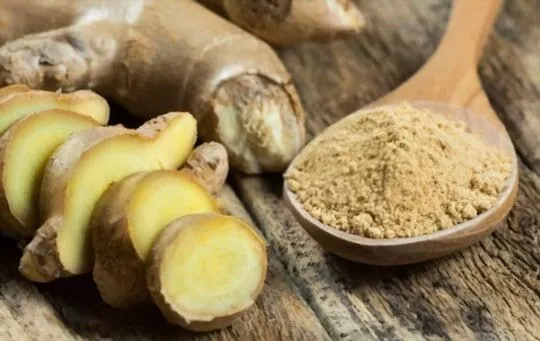
Ground ginger is a versatile spice that is derived from the dried and powdered ginger root.
It is commonly found in the spice aisle of supermarkets and offers a convenient and readily available alternative to fresh ginger.
While it may not provide the same intense flavor and aroma as fresh ginger, ground ginger can still impart a warm, spicy taste to your curry dish.
To substitute fresh ginger with ground ginger, use a 1:6 ratio, meaning 1 teaspoon of ground ginger is equivalent to 6 teaspoons of fresh ginger.
This spice is also an excellent option for those who may not have access to fresh ginger or need a quick fix when preparing a curry meal.
2. Crystallized Ginger
Crystallized ginger, also known as candied ginger, is a sweet and spicy treat made by cooking ginger in sugar syrup and then allowing it to dry.
This preservation process results in a chewy, sugary piece of ginger that retains some of its original spiciness.
Crystallized ginger can serve as an alternative to fresh ginger in your curry recipe, but keep in mind that it will add some sweetness to the dish.
To balance the flavors, consider reducing any added sugar in the recipe or adjusting the other spices to compensate.
To use crystallized ginger as a substitute, finely chop or grate the amount equivalent to the fresh ginger called for in your recipe.
3. Galangal
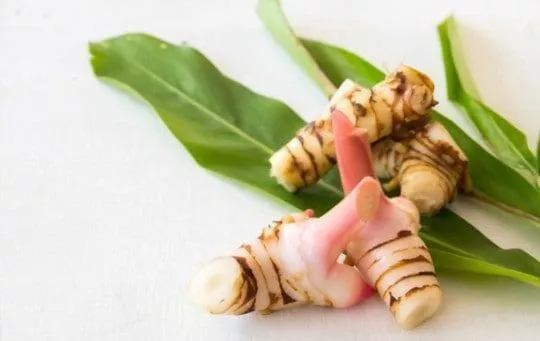
Galangal is a root from the ginger family that shares a similar appearance and flavor profile to its more well-known cousin.
Galangal boasts a complex flavor, with hints of citrus and pine, and a slightly sharper, spicier taste than ginger.
While not identical in flavor, galangal can be an intriguing substitute for fresh ginger in curry dishes.
Swapping fresh ginger with galangal can add an exotic and unique twist to your meal, offering a slight variation in taste that may pleasantly surprise your palate.
To use galangal as a substitute for fresh ginger, simply use an equal amount of galangal as you would fresh ginger in your curry recipe.
4. Turmeric
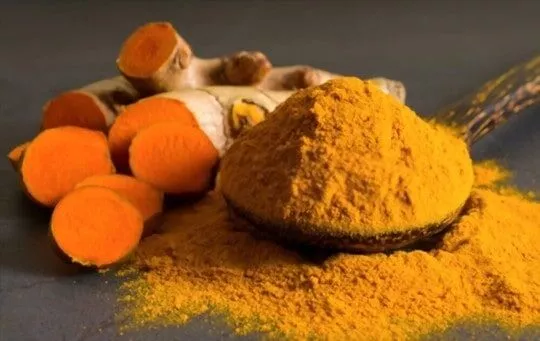
Turmeric, an earthy, vibrant spice, is a staple in many Asian and Indian dishes, known for its rich golden color and health benefits.
Its flavor profile, while not an exact match for ginger, complements curry dishes exceptionally well.
By incorporating turmeric into your curry, you can achieve a similar warming effect and depth of flavor as with fresh ginger.
In addition to its culinary uses, turmeric is revered for its anti-inflammatory and antioxidant properties, making it a wholesome choice for your curry recipes.
To substitute for fresh ginger, start with a small amount of turmeric and adjust to taste, ensuring a delightful balance of flavors.
5. Cardamom
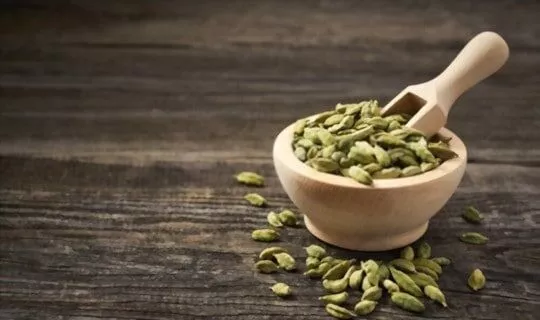
Cardamom, a fragrant spice native to India, offers a unique and aromatic flavor with hints of citrus and mint.
This versatile spice can be used in both sweet and savory dishes, making it an ideal ingredient for curry recipes.
Although cardamom’s flavor profile differs from ginger, it can still provide a warming and aromatic touch in your curry.
By incorporating cardamom into your dish, you’ll introduce a delightful complexity that complements other spices beautifully.
To use cardamom in place of fresh ginger, start with a small amount and adjust as needed, creating a well-rounded and harmonious curry.
6. Allspice

Allspice, with its warm and aromatic nature, is a versatile ingredient that can be used as a substitute for fresh ginger in a pinch.
Its flavor profile, while not identical to ginger, shares some similar characteristics, including hints of warmth and spiciness.
Allspice works well with other spices commonly found in curry, such as cumin and coriander, resulting in a delicious and well-rounded dish.
To use allspice as a substitute for fresh ginger in curry, begin with a small amount and adjust according to your taste preferences, ensuring a satisfying and flavorful meal.
7. Cinnamon and Ground Cloves (Combination)

Combining cinnamon and ground cloves can create a warming and aromatic flavor profile that mimics the essence of fresh ginger.
Cinnamon offers a sweet and earthy taste, while ground cloves contribute a bold and spicy kick.
Together, these two spices can provide a well-balanced warmth and depth to your curry dishes.
To substitute for fresh ginger, mix equal parts cinnamon and ground cloves, then add to your curry recipe in small increments, adjusting the amounts as needed.
This combination of spices not only imparts a unique and delectable flavor to your curry but also adds a delightful aroma to your culinary creations.
Frequently Asked Questions (FAQs)
- What can I use instead of fresh ginger in a curry? There are several substitutes for fresh ginger in curry, including ground ginger, ginger paste, crystallized ginger, and galangal. Each of these substitutes has a slightly different flavor and texture, so it’s important to choose the one that best fits your recipe.
- Can you use dried ginger instead of fresh in curry? Yes, you can use dried ginger instead of fresh in curry. However, dried ginger has a more concentrated flavor than fresh, so you’ll need to adjust the amount accordingly. As a general rule, use 1/4 teaspoon of dried ginger for every tablespoon of fresh ginger called for in the recipe.
- What can I substitute for 1 inch fresh ginger? If you need to substitute 1 inch of fresh ginger in a recipe, you can use 1/2 teaspoon of ground ginger, 1 tablespoon of ginger paste, or 1 tablespoon of grated galangal.
- What is a good substitute for galangal in curry? If you can’t find galangal, you can substitute it with fresh ginger or turmeric. Both of these ingredients have a similar flavor and can be used in the same quantities as galangal. However, keep in mind that galangal has a slightly different flavor than ginger or turmeric, so the taste of the dish may be slightly different.
Conclusion
In conclusion, fresh ginger is a key ingredient in many curry recipes, but there are several substitutes that can be used if fresh ginger is not available.
The best substitute will depend on the recipe and personal preference. Ground ginger, ginger paste, crystallized ginger, and galangal are all good substitutes for fresh ginger in curry. Turmeric and fennel seeds can also be used as substitutes, but they have a slightly different flavor profile.
To help choose the best substitute for a particular recipe, we have compiled a table below that summarizes the different substitutes and their recommended quantities.
| Substitute | Quantity |
|---|---|
| Ground ginger | 1/4 tsp per 1 inch fresh ginger |
| Ginger paste | 1 tbsp per 1 inch fresh ginger |
| Crystallized ginger | 1 tbsp per 1 inch fresh ginger |
| Galangal | 1 inch fresh ginger |
| Turmeric | 1 tsp per 1 inch fresh ginger |
| Fennel seeds | 1/2 tsp per 1 inch fresh ginger |
By using these substitutes, you can still achieve a delicious and flavorful curry even if fresh ginger is not available.
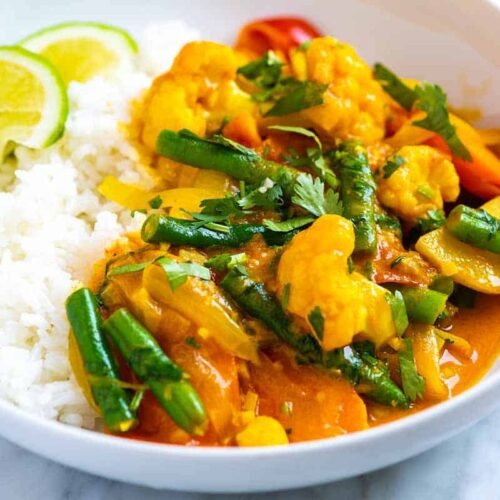
The 7 Best Substitutes for Fresh Ginger in Curry
Ingredients
- Ground Ginger
- Crystallized Ginger
- Galangal
- Turmeric
- Cardamom
- Allspice
- Cinnamon and Ground Cloves (Combination)
Instructions
- Pick your favorite substitute from the list above.
- Follow cooking directions for your selected substitute with the proper ratio of ingredients.
Jenny has always been passionate about cooking, and she uses her platform to share her joy of food with others. Her recipes are easy to follow, and she loves giving tips and tricks to help others create their own unique culinary creations.

